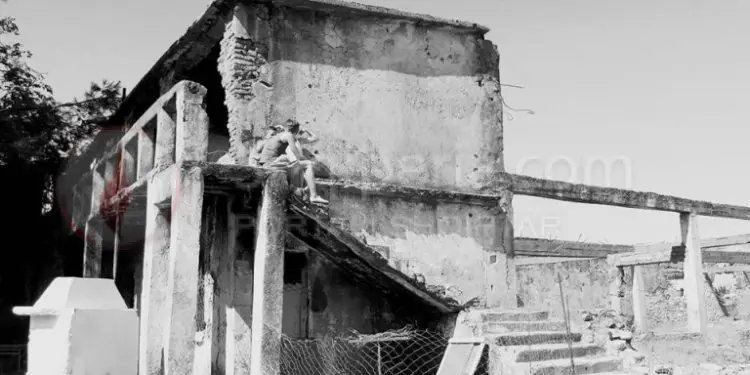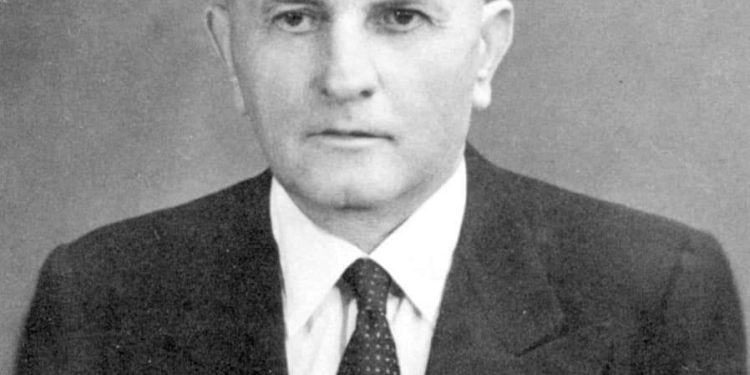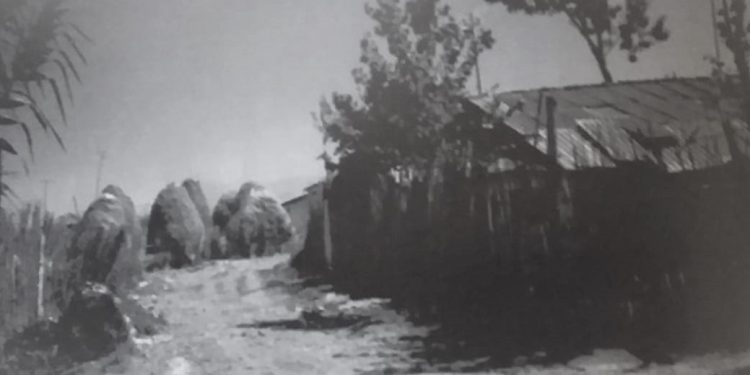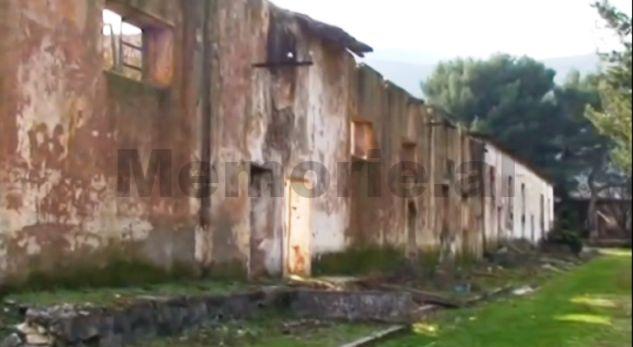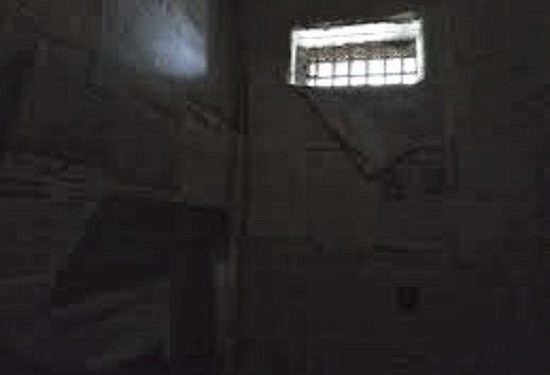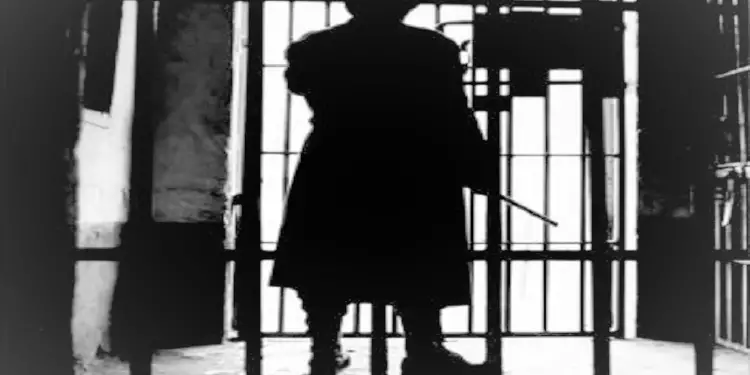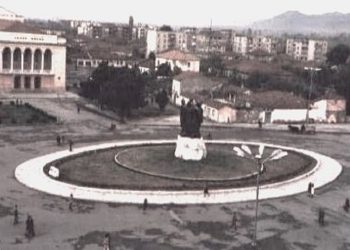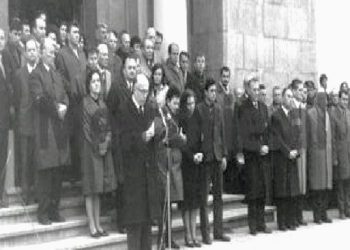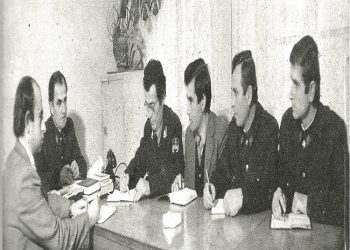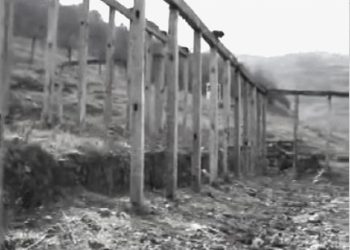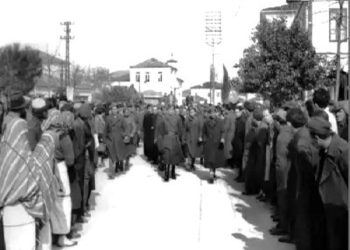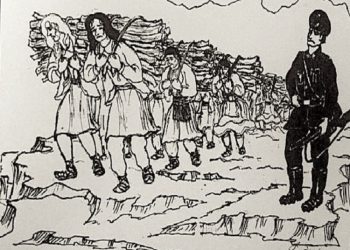From Gani Kupi
Second part
Memorie.al / “Before the Germans left Albania, my father, Shaban Kupi, was a fugitive together with his brother, Abaz Kupi. And after Abazi fled to Italy, together with his two sons (Petrit and Rustem) and some friends, my father, Shabani, continued to be on the run for a long time. So he was always away from the family home. I remember one occasion: it was evening and I suddenly saw my father in the yard, which had come secretly. After he asked me about some family issues, he asked me to prepare some clothes and food for him to take with him. During the conversation, he headed towards a room which was off the roof of the house, separated from the courtyard, but he saw that the door was closed. There were 10 partisans, whom the Neighborhood Council had assigned to us for housing and food.
Continues from last issue
One night, Baba Samiu of Kulmak and I knocked on the door and asked the guard to open the door so we could go out to urinate. When the door opened, the guard slapped Baba Sami’s face. After him, me too. That’s why we were also praying: “Is there a policeman on duty who doesn’t have a hand”! Unfortunately for us, it was police officer Kasemi from Gorishti, who was carrying a 60-70 cm baton tall and with a head. He left that stick inside the basket, and every time he had a service, he found it there.
When I met with Sami later, we talked about the investigation and the intense torture. He told me that in addition to the beatings, they also used electric current on his hands, ears and genitals. From these severe tortures, he jumped from the third floor window to die, but God willed and he did not die. When he jumped, Sami had fallen on the barbed wire, with which the place has been surrounded. When he fell on the wires, he broke a tooth and his right hand on his back, which he always had swollen to the end, why wasn’t he sent to the bone doctor to have the fracture replaced, but, left to the mercy of fate.
Let’s go back to the prison: those of us on the first floor were taken to work at the Otllak farm, which was before entering Berat. We worked hard; we used to make canals. The work in Otllak had been very good, after the evening, we would go back to the prison and sleep in our beds. While the second year, in 1947, they took us to the Maliqi canal, for six months in a row. The director of the prison was a certain Tasi Marko, Rita Marko’s brother. They said that he was a baker before, but as a camp director he had the rank of “lieutenant” and was a man without authority.
We worked with a hand bucket, scooping out dirt and mud on the bank of the canal. When any of the prisoners, for various reasons, stopped for a while, those who came with a cart behind him fell on his feet and crippled him. When we worked in the excavation, the soil and cold water reached up to our waists, and because of this, the food in our stomachs soured. Doctor Pogu, who came from the Shkodra prison, advised us to put woolen things on our stomachs; so whoever had any flannel, socks or woolen scarf left, put it on his stomach.
We slept in tents because there were no buildings in the camp. I slept in the tent with two Jewish brothers; their names were Pepi Levi and Moisi Levi, who came from Vlora Prison, whiles my brother, Samiu, I don’t remember who he was with in the tent. After six months, tired and hungry, we returned to Berat Prison.
Once when we were talking brother to brother and among other things, we again came up with the issue of throwing out of the window. I asked him where he went after he jumped from the prison window and how did he escape alive. Sami told me: “Since I was very shocked and overwhelmed, I went to the hills, to the olive groves of the “Vakef” neighborhood, and I don’t know how I walked, until I came across a stream. There was something like a cave. Powerless to go far, I waded into the stream, and was covered with mud.
I stayed there until it got dark. When it got dark, so crushed and with all the pain I had, I slowly went home. I found the long-suffering grandmother, who immediately let me in and went and got the owner of the house where we lived, whose name was Sabri Lubesha, a very good man and family from Berata. They then took me in their arms and took me back to the Internal Affairs Branch, because I didn’t even know where to run, but even if I knew, I was helpless. Do you know what Dan Saliu, who was a guard in the branch, told me, he told me that he had been ordered to kill Sami whenever you see him! I told Sami that it was a good solution, that it was covered with dirt.
“When I surrendered, they tortured me again – continued Sami, – and after a few days, they sent me back to prison”. The day after Sami’s escape, in Dega, they took our mother and two brothers who were younger than me.
Our mother was tortured to tell where Sami was. They used electricity, electric current and left her standing, when it was known that she was suffering from heart disease. The two younger brothers beat them to tell if Sami came home or not.
I am returning once again to the time of the investigation, for something that remained a mystery: a few days after I finished the investigation, I was taken to prison. In this case, the aspirant Emërlla Kuta appeared again. As soon as I saw it, I remembered the naganti who addressed me with a trembling hand. He told me: “Get ready, I’m going to take you to prison.” I got ready, we went down the stairs of three floors and left, but not through the road that was closest, but choosing another road, which was much longer, from the “Vakef” neighborhood.
Emërllai told me: “I’m not going to tie your hands, but watch your money and don’t talk to anyone”, while he had the nagant in his hand and was sitting behind me. I still don’t know why the German untied my hands. What if I tried to run away and he killed me? Finally, I was taken to prison and since then, I have not seen Emërlla Kuta again.
Zymer Halili was the head of the Department of Internal Affairs at the time Sami and I were arrested. A woman from Gurëzi (a town in the district of Kruja, co-villager with Zymer) who was also interned because she had a runaway son, after Sami jumped out of the window (a story that caused a sensation in Berat at the time), tells Zymer: “O Zymer, don’t mess with toads. Release him from prison because it is a sin”! This lady, as far as I remember, was named Katrína Tonja.
As a reminder: I was 16 years old and Sami was 18 years old when we were arrested. We remembered that Zymeri was from Kosovar, but, after 8-9 years, here in the USA, when I was having dinner with a friend of mine from Plave where 15-16 people were invited, during the conversation, it turned out that Zymeri had been from Plave a Gucie, somewhere from a village there, and not from Kosovo. From Zymer’s nephew, who was at this dinner, I learned that one of Zymer’s brothers had been shot by Enver, for various reasons, while I knew early on that Zymer’s brother had been shot because he had 1 million semi-deficit in the store, because he worked as a salesman.
But he, the brother, also did some secret work: he was taken by the then government to Yugoslavia on a mission. This was told to my father by a friend of ours, who went to Yugoslavia with Zymer’s brother. These two people were carrying Albanian flags and some papers. According to the friend, they had never left Albania through the border points that the leaders ordered them to, because usually, those who crossed the border of Yugoslavia where they were instructed to cross, were ambushed by the Serbs, and many of them were killed at the border.
Returning to the prison period: after Maliq, we were taken to Beden of Kavaja, for the drying of the marsh of Zhabjak. The camp was surrounded by barbed wire (as was the case in all camps and prisons), and it was so dense that even Skilja could not get out. Every 30-40 meters, there was a watchtower with armed policemen or soldiers, did you say we were big criminals, when rarely, if any of us, were criminals, but, people who had done no wrong, only they didn’t like the communist regime. And precisely for this “guilt”, we were working on the Beden Canal.
We were assigned to brigades, and I was assigned to Qazim Osman’s Brigade, which belonged to the Shkodra prison. The team where I worked was filled with Catholic priests from Shkodra and one Shefqet Muka, yes from Shkodra. One day the machine gun went off. We were working in the canal, but at the same time we sat down to protect ourselves from the bullet. Shyqyri Rjolli, the commander of the military troops, was seen from afar in short shorts, as if he had gotten out of bed, walking and shouting to the guards surrounding the camp “Don’t increase!
Do not add”, several times, until the situation calmed down. Then we got up and started working again. The director of the camp, Haxhi Pela from Lushnje, was not seen at that event and I still don’t understand today why those shots are similar.
Priests and High Priests tormented Muka especially. So, our brigade was taken to the most difficult plots, with water and mud. I saw with my own eyes when the policeman told Shefqet: “Lie down in the mud!” again and again. They did the same with the priests. The rate of digging was 8 cubic meters per man, but there were prisoners who did 25 cubic meters in waist-deep digging.
I remember a young Vlonjat boy who, from overwork, was paralyzed on both sides, and it was heartbreaking when he started to cry because of the pain and the camp command was not at all interested in taking him to the hospital. I also remember a prisoner from Lushnja, Hasan Spaho, who dug with his waist up to 25 cubic meters of soil, which at the same time had to be thrown out, on the canal embankment. The ground was hard and there were also mines.
During the work, without knowing that there were mines, one of the Agaçi brothers from Lushnja was injured and lost consciousness and it is not known how his fate ended.
One day, inside the camp during the time of rest, my brigadier, who was from the sea coast (from Himara a Dhërmiu), was looking for me; before that he had been a party member and now he was an ordinary prisoner. He ordered me to go and fill the canister with water for the camp command, with another friend whom I did not know at all, work which, usually; they made prisoners with light sentences. Although I tried not to go out, Nikua (that’s what the brigadier was called), didn’t leave me room, looking for me, and it was impossible to avoid him. In the end, I went out with that other friend and with a can on each shoulder, we headed for the tap.
We filled the jerrycans and returned to the camp. During this time we were accompanied by a sergeant, who was a very wise boy, and who had an automatic weapon. After a few days, a prisoner told me that: “They took you out allegedly to fill water, and pretending that you wanted to escape, the sergeant killed you.” But this was not the case. He told me that the sergeant had been told: “Why didn’t you kill Gani”? The sergeant replied: “He didn’t try to run away, and I don’t kill anyone”!
At the same time I’m talking about, in the Maliqi camp, in the same way, Muharrem Xjixha, the nephew of the Kupi family, was killed. I remember one time: the night before, it rained a little and the road, where we were going to cross, was flooded in places. When we returned from work to the camp, we had to walk fast, because those who stayed last were beaten. I, to avoid getting my feet wet, crossed the road, so I was a little late.
A big man grabbed me and put me under the armpit until we passed the wetness, and then he let me go.
It was Ymer Sakati from Hasi. While walking, he said to me: “It was not possible for your ancestors”! Ymer was a tall, powerful man with a rather long moustache. In the half-collar of his coat was a fur, which, I believe, was wolf fur. When we got back to camp, he gave me a new pair of woolen socks. I thanked him for this gift, because my sandals had already been damaged in the prison of Berat, and usually, those who did not have shoes, took the shoes of others. And I haven’t seen Ymer since the Beden camp.
Somewhere, the canal had to cut through farmland. It was the drainage channel. There, the prisoners collected kikut, wild spinach, recin, etc., to eat, because they did not have food, and if they did not eat, they could not even protect themselves from diseases. I had an aluminum bowl, a sort of double wire bowl. On the bowl I had written my name and the date we arrived in Beden. I remember that one day my mind was filled with counting how many grains fell into my ration for lunch. I counted them; there were 9 grains in total, and the rest, just colored water. This was our usual food. Rarely, someone could come and bring food to the camp.
One day off, I was lying in bed like everyone else. Then, someone turns to me and asks me: “Do you see anyone here?” It was 4-5 beds away from me. “Why, – I asked him, what is possible”? He told me that his bread had been stolen, which, as I understood, he had left outside without putting it in the bag. And I have also seen very good men who collected tobacco and smoked it. I also once saw a prisoner who, after carefully looking to the side so that others would not see him, grabbed a watermelon rind in the garbage pit, dropped it twice on his pants to wipe it off, and began to eat it.
Before we broke up with Tito, they shouted at us and insulted us with whatever they could think of, and after we broke up with Tito, the climate changed. The director of the camp, Haxhi Pela, started to say: “Hey, brother, work as hard as you can”, and then, some policemen who had been the most brutal, started to turn yellow. At that moment, as if the prisoners ordered them: “Throw down the machine gun”! They would surely be ready to throw it away.
After relations with the Soviet Union were established, the situation in the camp changed again. One day off, which was a Sunday, the camp director ordered us all out of the barracks and gathered us in the yard, where he was going to give us a speech. He said: “There are many enemies of the People’s Power here…” and many wild insulting words, as a prisoner from Vlora, when we broke up with Tito, allegedly said that; “Now these will come like goats to the butcher”.
After he had finished his speech, in the eyes of all the prisoners, that Vlonjat, who might even have said those words, was taken by two policemen, they beat him with a stick until he broke his fingers, and they made him in such a condition that he could no longer stand up. There I saw that fatzi man, walking on all fours like cattle, or as we say in Kruja, walking on his feet, like babies. After all this torture, they tied him to a pole and left he tied there until late in the evening. There I realized that man is very strong.
One midnight, we heard a loud voice calling out with all its might: “I became the mother of Stalin and Enver Hoxha”, from the roof of the camp, where he had boarded. This prisoner was from the Catholic neighborhoods of Shkodra. The police entered the camp, with guns and batons, and ordered him to sit down, until they forced him down.
The roof was covered with tar barrels. They took him, took him out of the camp, and the man was never seen again. Who knows what they had done to him; they probably strangled him with wood.
I heard this event with my own ears. When he woke up, I asked my brother, Sami, if he had heard anything during the night, and he said yes. We also talked about the fate of the poor boy, and my brother said the same thing: that he could have been strangled with wood. Many of us, the prisoners, have heard his voice well, because the silo was lined with mats. After approximately 6 months, we returned from Bedeni, to Berat prison. As usual, we were so emaciated and reduced to skeletons from suffering that our family members hardly recognized us.
Then, the physical condition started to improve somewhat; a little of the food brought to us by the family (who were exiled at that time) and a little of the olives, we started to recover somehow. But I came back sick from Bedeni, so sick that for 15 days in a row, I have not closed my eyes for a single hour. When I went to the bathroom, I had to lean against the wall, dragging myself. Seeing my very serious condition, my brother Samiu, the first time the director of the prison came (who was called Nikolla Kule, and was from Myzeqeja), found the courage and told him: “My brother is very sick. Please, get a doctor to visit him”!
And indeed, within two days, an Italian doctor came, whom we knew very well, and he knew us very well. After he visited me, he gave me some grains and two bottles of fish oil of a yellow color, which I drank directly from the bottle, not with a spoon. So, my brother Sami, did not take into account the tortures that would be done to him after that, as policeman Kasemi, was very willing and he was very fond of using that bumpy stick.
It was a law that any prisoner who came before the director to ask for anything was sure to be beaten and tortured. After that, everyone, with great regret, waited for when the wood would start after the director left, but fortunately and to our surprise, policeman Kasemi, did not call him and did not say anything to Sami. My brother Sami, whom I got to know better both in prison and outside, did a lot for his people and friends. He was a man of self-sacrifice. Memorie.al




